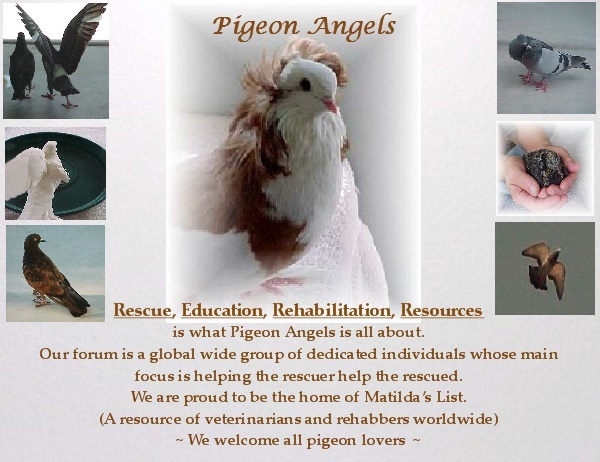Canker is an infectious protozoal disease that affects pigeons, doves and other birds. Most pigeons carry the organism in their crop and gullet; because of this adult birds have some immunity but its effectiveness is stress related.
The organism that causes canker is fragile and cannot survive for long outside the digestive tract and associated areas, but it can survive a day in water at 25 degrees C.
It is spread via water, via seed that has been taken up and dropped by an infected bird and by courtship food exchanges between adults. Parent birds will normally pass on small quantities of trichomonads to their young, giving them gradual exposure to the organism which helps them develop some immunity , but if the parent is stressed or has low immunity it can have an overload of trichomonads which - when passed to the youngster - will cause disease.
Canker can block the oesophagus and the exit from the crop, causing death by starvation and dehydration. Prompt treatment is essential.
SYMPTOMS IN SQUABSNot all these symptoms will be present in each case. The symptoms appear 6 days after infection.
Visible lump in the neck or navel area.
Stretched skin over site of lesion.
Cheesy growth in mouth or throat.
Patches of baldness around neck and mouth .
Slow blinking
Ruffled feathers
Loose watery droppings
Excessive thirst
Loss of appetite
Loss of weight
SYMPTOMS IN ADULTSNot all these symptoms will be visible in each patient:
Visible lump in neck or vent
Firm yellow or brown cheesy mass in back of mouth
Soft flat creamy white growths in throat
Inability to swallow seed
Mouth may be partially open
Birds stand upright with head high and neck straight (penguin posture)
Crop full of water
Distortion or swelling of forehead (if sinuses have been invaded)
Vomiting
Increased mucous in the throat
TREATMENTDo not try to remove the canker lesions, this can cause a fatal bleed.Adults can be treated with one tablet 10 mg tablet of Spartrix (Carnidazole) daily. A youngster can be treated with half a tablet daily.
Flagyl syrup (metronidazole) can be given either instead of or together with Spartrix. 0.3ml per 100 gms of pigeon bodyweight.
While being treated the pigeon will need supportive care as often they are unable to eat. Provide warmth by using a hot water bottle wrapped in a towel, or an angled lamp with a 40 watt bulb so that they don't have to use what energy they have keeping warm.
Provide rehydrating solution as drinking water. Pedyalite is suitable or you can make your own by mixing 1/2 pint warm water with 1/2 teaspoon of salt and 1/2 tablespoon of glucose, honey or sugar.
There are products like Poly Aid that can be fed in liquid form and will stop the pigeon from starving while the nodules clear up.
Canker usually clears up quickly, but can take up to 10 days and on rare occasions will damage the beak permanently.
This is a photo of the pigeon pictured above after his canker had healed:
Please note...this information was taken from an article by Australian veterinarian, Colin Walker...Charis


